My feelings about the wars are ambivalent - memorials to the dead soldiers bring a node to my throat and I love visiting war cemeteries. However, I am also against the wars. Gandhi ji and his ideas about non-violence have been my inspiration. I remember being part of the protest march in London against the Bush-Blair decision to attack Iraq.
Yet I believe that some times, especially when dictators, fascists and fundamentalists of different colours and ideologies kill their people, wars can be necessary.
Let me start this photo-essay with the picture of a dying soldier from a war monument in Verano cemetery in Rome (Italy). It is my favourite image about the war memorials - it shows the moment of the death of a soldier, as his heart stops beating, his eyes turn unfocused and his body starts to fall down.
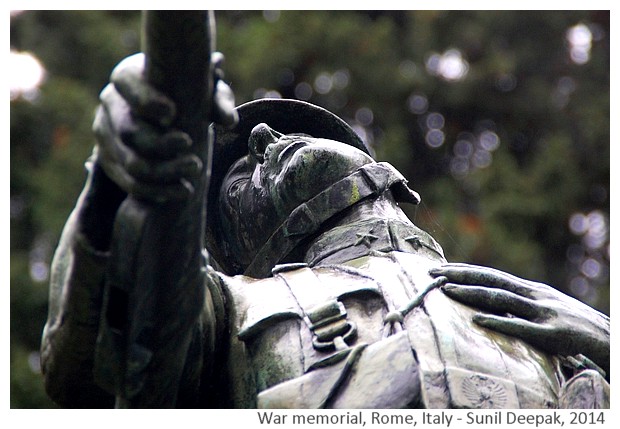
Another reason for my ambivalence about wars and soldiers is the way they treat civilian deaths. The deaths of soldiers are considered more important and they are mourned, while the civilians killed "by mistake" or as "necessary collateral damage" are usually forgotten, or sometimes even depicted as terrorists or their accomplices. The way we give values to lives of different people is very unequal.
I also feel that usually wars and violence do not solve any problems - rather, while they solve somethings, they invariably create new problems. I also suspect that most recent wars, though presented as humanitarian efforts to "liberate people" or to "stop despots and mass murderers", were for gaining and controlling power and resources.
This photo-essay is about the war monuments built to remember the soldiers killed in wars. I am also working on a second part of this photo-essay about the other victims of wars and people who fight for their rights. As you can imagine, putting together that second photo-essay is much more difficult because we hardly ever build monuments to remember ordinary persons, except for the victims of some big events like holocaust or the people killed in the 9-11 terrorist attack.
WAR MONUMENT FROM INDIA
I grew up looking up to two of my uncles, brothers of my mother, who were soldiers in the Indian army. Seeing them in the military uniforms and hearing their stories about the wars, shaped my initial ideas about nationalism, patriotism and protective role of the men in the society. Even today, though women can also become soldiers, the common public image of the soldiers remains anchored to masculinity.
The most important Indian war monument is called the "Amar Jawan Jyoti" (Immortal light of the soldier). It is located at India Gate in New Delhi. India Gate was built in 1921 to remember the soldiers from Indian regiments who had died as a part of the British army in the first world war. Its walls carried the names of the officers of Indian regiments.
In 1971, after the India-Pakistan war that led to the creation of Bangladesh, it became "Amar Jawan Jyoti" with the construction of a black slab with an upside down gun and ever-lit flame underneath the arch of Indian Gate.
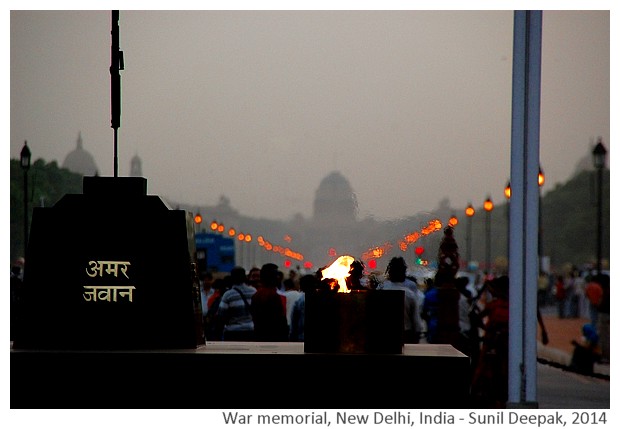
The next image is also about Indian soldiers. It is from the second world war and is from Forli in Italy. It shows a Sikh soldier holding an injured Italian soldier. This monument is built next to one of the biggest cemeteries of Indian soldiers in Italy.
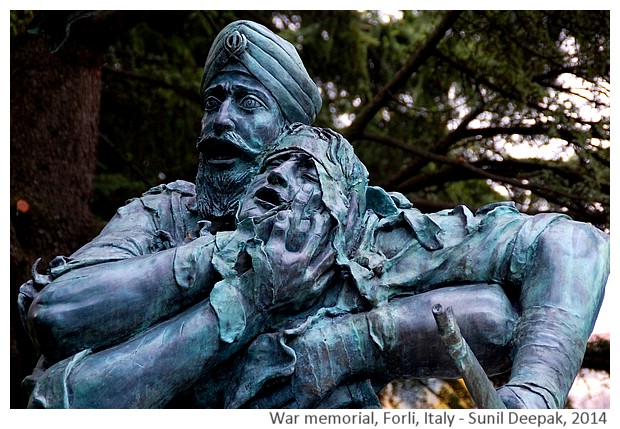
If you are interested in reading more about the Indian soldiers and their cemeteries in Italy during the second world war, you can read my post on this theme written in 2011 in my Hindi blog.
Though many more Indian soldiers have died in different wars over the past decades, I am not aware of any other war monuments In India.
WAR MONUMENT IN USA
The image from New York, is the marine soldiers' monument from the second world war, built at the tip of Manhattan as you look towards the statue of Liberty.
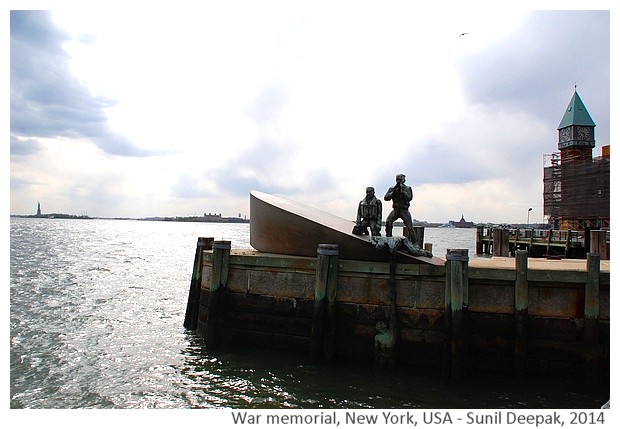
Another important war monument in USA that I had visited was in Washington DC, near the Lincoln statue - Vietnam Veterans memorial. How ever, I do not have any images from visit.
I have also heard about the Arlington national cemetery and the US Marine War memorial, but I did not get an opportunity to visit them.
MEMORIALS FOR THE GERMAN AND AUSTRIAN SOLDIERS
A large number of German and Austrian soldiers had also died during the first and the second world wars. However, I do not remember seeing any war memorial about those soldiers. This may be partly due to the defeat of Germans (and Austrians) in the both the world wars.
In Germany, to remember the Nazi past is also problematic so perhaps those soldiers remain unacknowledged in the national monuments. How ever, I must confess that I haven't been to many places in Germany and Austria, so perhaps some war memorials may be there about which I am unaware.
Soldiers fighting for the "wrong" side and those who are defeated, hardly ever get any monuments. History decides who will be remembered and in which way. Just to remember that even Germans and Austrians had died in the two world wars, the next image has the ruins of an Austrian soldiers' outpost in the mountains in north Italy. Though this is not a formal monument, but I wanted to acknowledge them in this post.
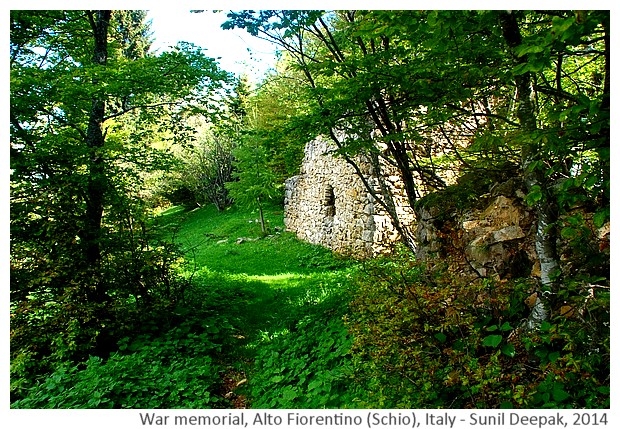
The next war memorial is from Vienna in Austria but it is not about Austrian soldiers - rather, it is for commemorating Soviet soldiers and was built by the occupying Russian army in 1945.
This monument is to remember the death of 17 thousand Soviet soldiers who had died in the siege of Vienna. It is called the "Heroes' Monument of the Red Army".
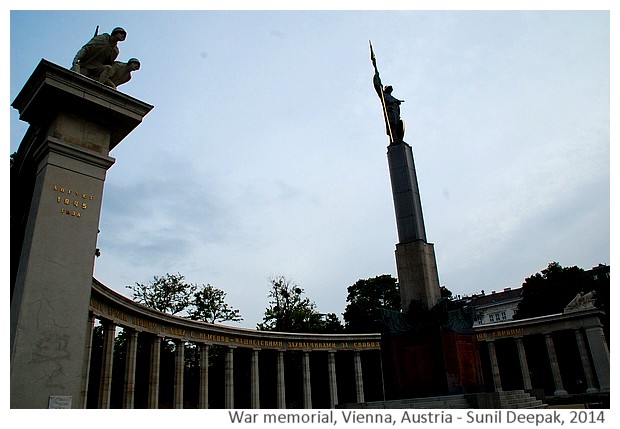
WAR MONUMENT FROM FRANCE
I did travel to different parts of France and I remember seeing some war memorials, but those journeys were much before I had discovered my passion for photography. Thus I do not have many images of the French war memorials.
The next image shows a small memorial of the second world war from the tiny town of Divonne les Bains in the south of France. The monument carries the list of the persons from the city who had died in the war.
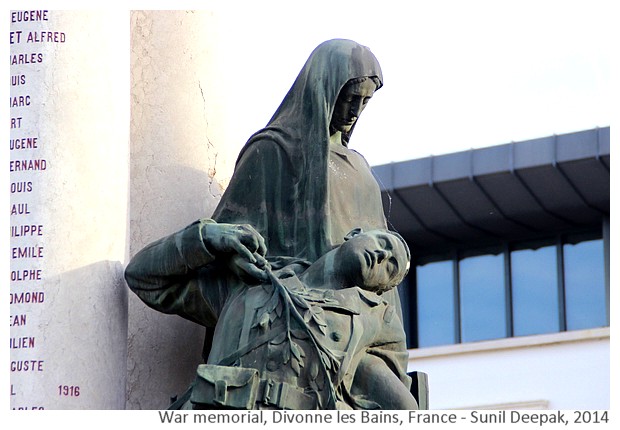
WAR MEMORIALS FROM LONDON, UK
London also has different monuments to remember the persons dying in the first and the second world wars.
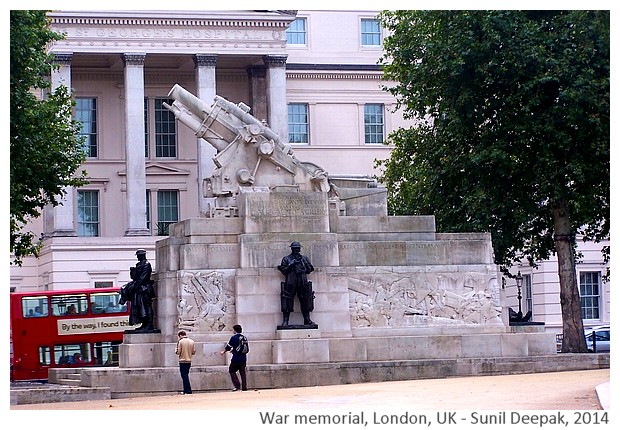
Another of my personal favourites is the British monument in London for the animals who died during the world wars.
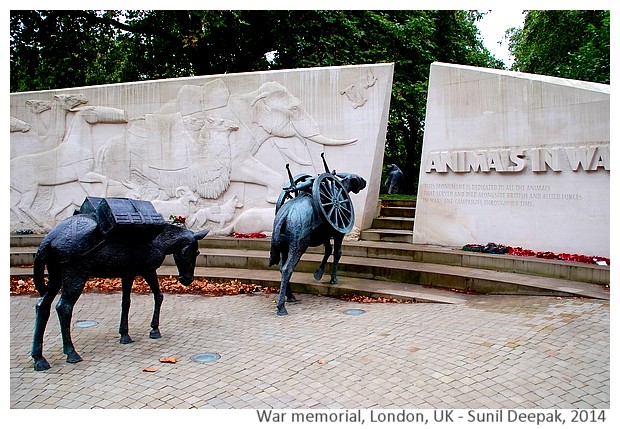
WAR MONUMENTS IN BRUSSELS, BELGIUM
Brussels is surprisingly full of war related monuments, from the first and second world wars. The next four images show some of those monuments that I noticed during a brief visit to the city.
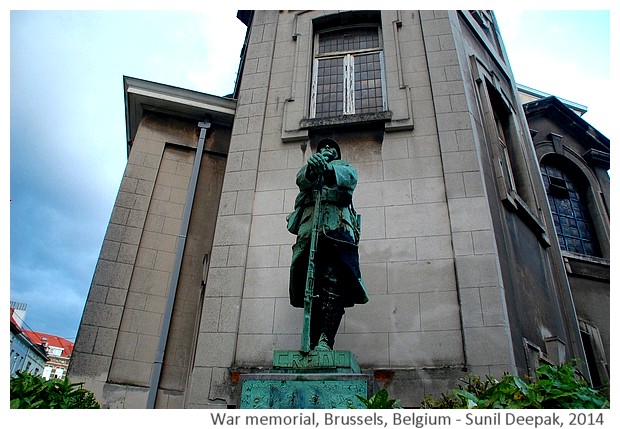
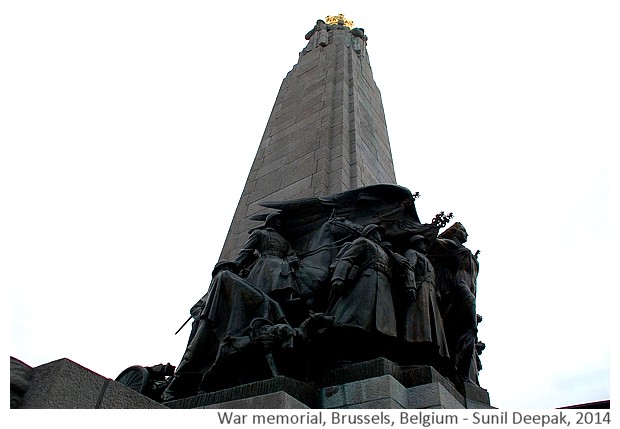
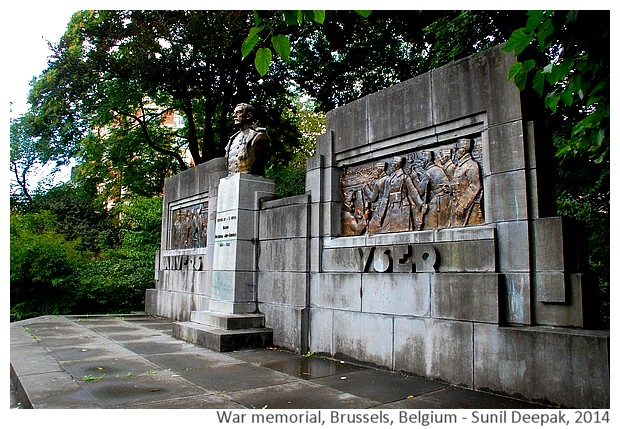
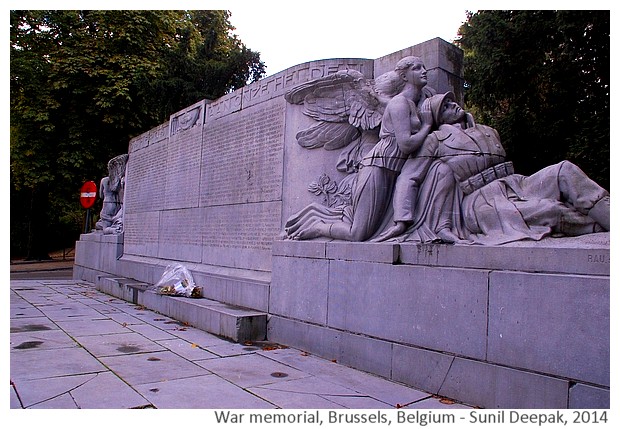
WAR MONUMENTS FROM ITALY
My interest in the war monuments started in Italy and thus, this is the section with largest number of images in this post.
Our house in the north-eastern Alpine city of Schio (Vicenza), is very close to what was once the border between Austria and Italy. During the first world war, fierce fighting had claimed lives of young men from almost all towns and villages of this part of Italy. Around Schio, I am always struck by the war memorials in the villages and the small towns, invariably having a list of local lads who had died in the first or second world wars.
The next 5 images of war memorials are from places near Schio, remembering soldiers from the first world war. The places are Sant'Antonio, Arsiero, Forte Maso, Asiago and Bassano del Grappa.
The "Ossary" at Sant'Antonio is located at Pian delle Fuggazze, the old Austrian-Italian border on Pasubio mountain, and contains bones and remains of hundreds of soldiers who died here.
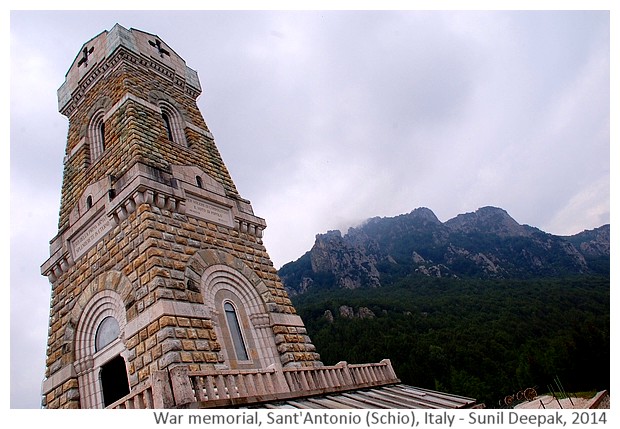
Arsiero is a tiny town at the entry to Tonnezza and some valleys hidden behind the mountains. Beyond Tonnezza, the road leads to Altopiano Fiorentino, that was another of the border post that saw fighting in the first world war.
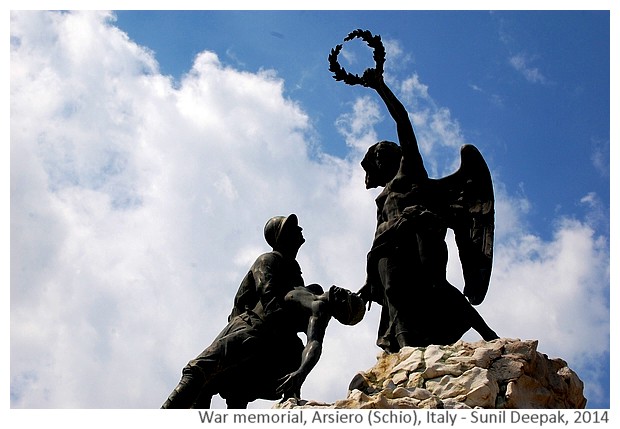
Forte Maso has an old war building hidden among the trees in the mountains on the way to Pasubio mountain. A telescope, old pictures of the war, a restaurant and the beginning of a mountain trail to go up the mountain, mark this place. The image below shows one of the old war pictures from Forte Maso.
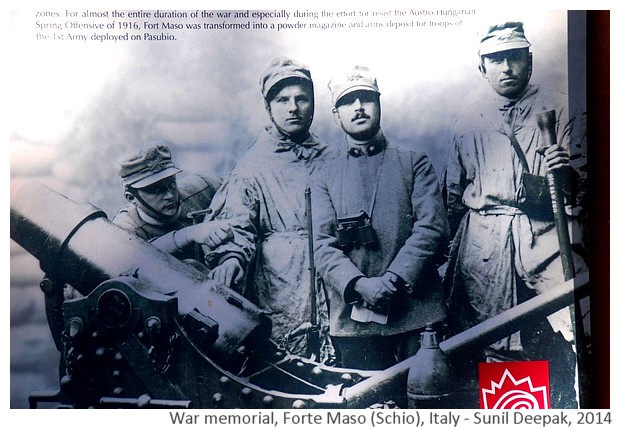
The beautiful mountain city of Asiago has a huge arch in white stone, at the top of a hill. The base of the hill contains hundreds of tombs containing the bones or remains of the soldiers.
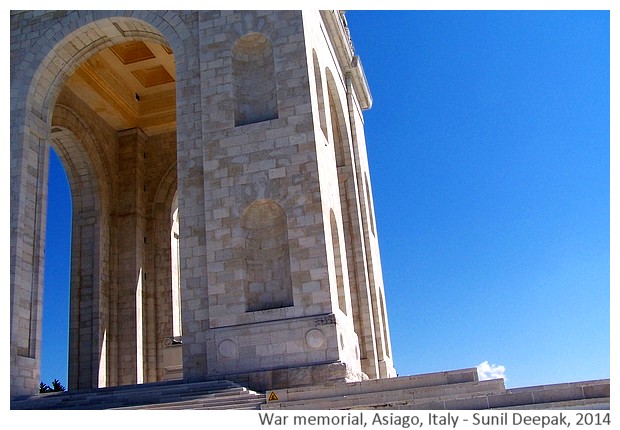
I am especially fond of the "war memorials" from Bassano del Grappa that have pictures of young soldiers fixed on the trees.
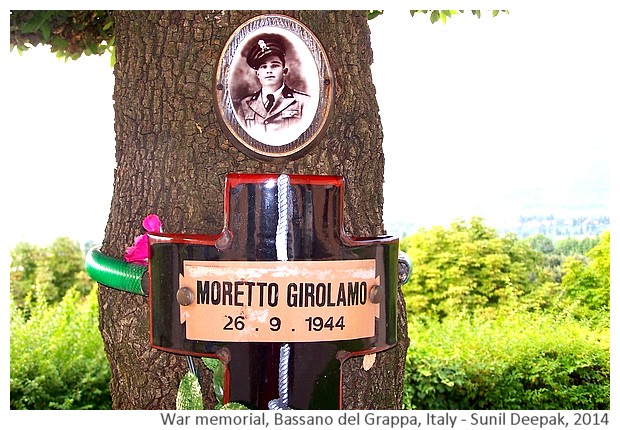
The next 3 images are from Bologna, showing the monuments about different wars. The first monument is about first world war and is from Certosa cemetery.
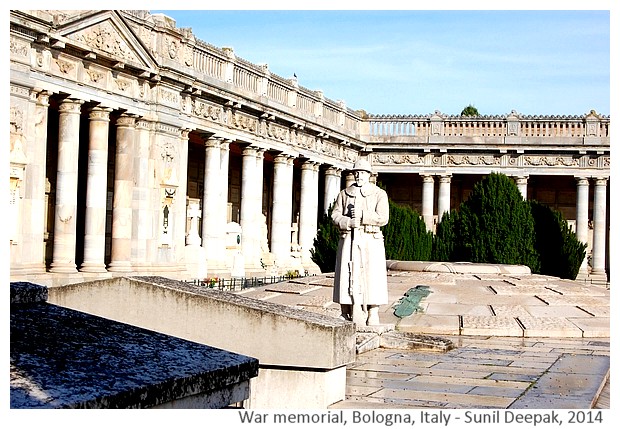
The next image is about a war in 1848 when Bologna was able to defeat Austrian army that occupied the city as allies of the Vatican Government. It is known as the 8 August monument.
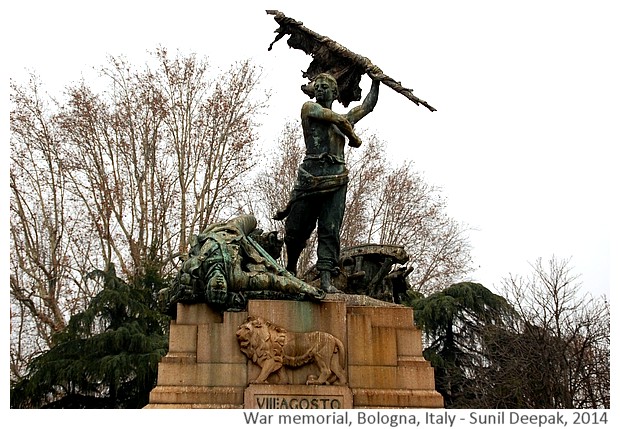
The 3rd image is of the memorial for the soldiers who died in the second world war and is from Certosa cemetery in Bologna. The sculptures are by Stella Korczynska and Genni Mucchi.
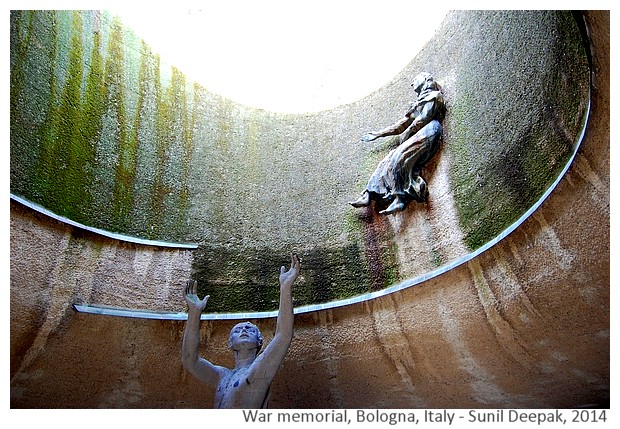
The next image is from Redipuglia in Fruili region of Italy, not far from the border with Slovenia and Austria, where thousands of soldiers from the first world war are buried.
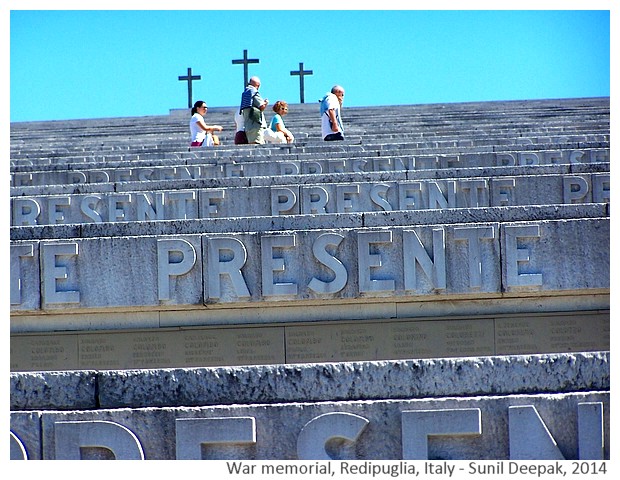
The next image is a monument to Francesco Baracca, an ace pilot in the first world war. This monument is in the city of Lugo, where he was born.
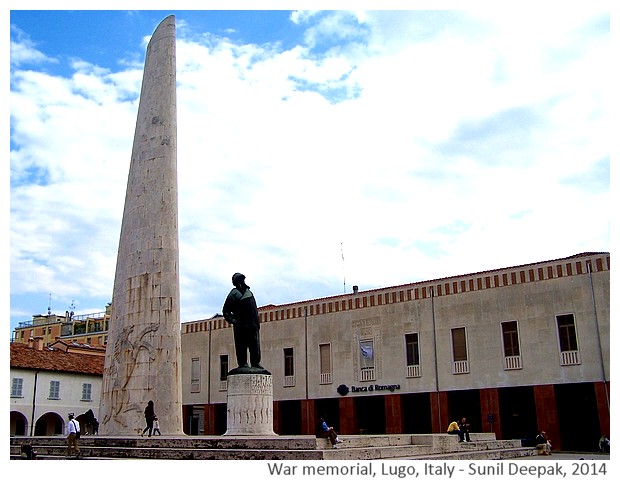
Finally the last image from Italy is from the Marine Soldiers' monument in Verano cemetery of Rome.
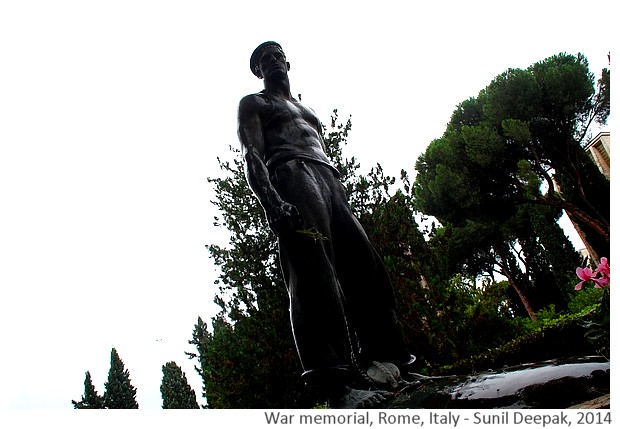
CONCLUSIONS
Apart from India and USA, all the images of war memorials to the dead soldiers in this post are from Europe. In different other countries of South America, Africa and Asia, I do not remember seeing any war memorials.
To conclude this photo-essay, the final image is once again of the monument to the Soviet soldiers from Vienna.
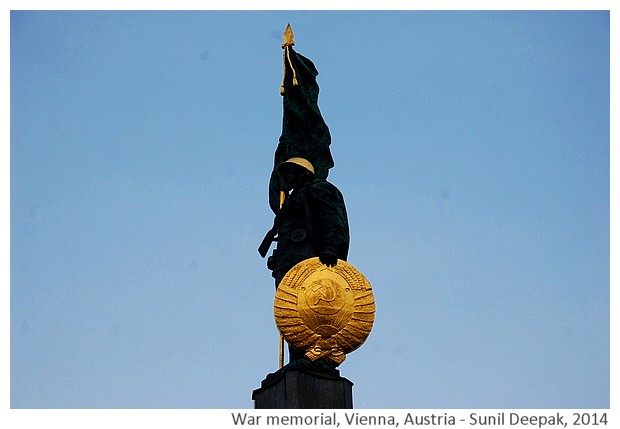
So what do you feel about war monuments? I feel that war monuments are useful mainly for building patriotic feelings so that young men and women feel encouraged to give their lives for military services.
During the wars and in the years immediately after the wars, there is a lot of patriotic build-up and rhetoric around soldiers. However, once wars are over, countries often forget them quickly. In many countries, ex-soldiers with physical and psychological disabilities are ignored and marginalized.
Some years ago, I remember watching a Bollywood film called "Dhoop" that had shown the callous behaviour of Indian bureaucracy towards the family of a dead soldier. I wonder if that kind of situation is unique to countries like India?
***






Really appreciative compilation of these war memorials . Great work
ReplyDeleteThanks Yogi for your appreciation :)
DeleteI don't support wars either,but salute to those who gave their lives.Great list.
ReplyDeleteThanks Ankita. I hope that we, people who normally do not support wars but are not extremists (either in favour of or against the wars), are the majority in the world! :)
DeleteThis is great post. The description of each war memorial is very nicely presented. I have been to Amar Jawan Jyoti (at India Gate, New Delhi) once. Talking about the atmosphere - there were families all around, number of photo shoots, kind of picnic spot, but I haven't spotted any signboard (atleast from the non-restricted area open for public) where one can read more about the memorial, the series of event happened during the war, how our soldiers sacrificed their life for the service of the motherland - which I think is necessary to educate people about the memorial and also the value of serving the country.
ReplyDeleteThanks Vishal. :)
DeleteAbout Amar Jawan Jyoti, I agree with you that putting a board that informs the public about the history of the monument will be educational. Most archeological monuments have boards from ASI providing some information, but since this is a new monument, perhaps such information can be added!